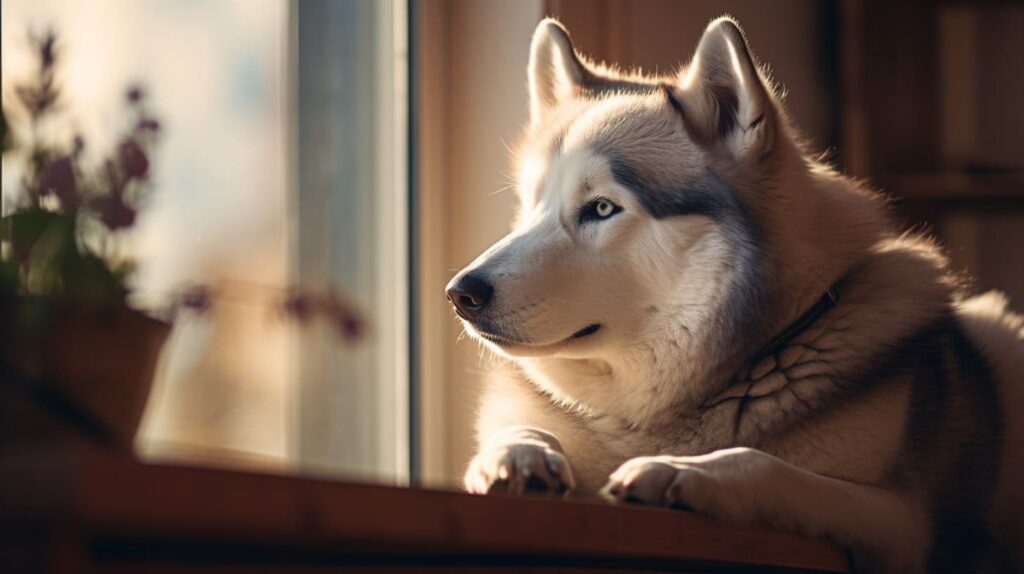A Husky Tale: Howling Hearts and the Art of Coping with Separation Anxiety
Picture this: you’ve just said your tearful goodbyes to your beloved Husky, promising them you’ll be back soon from work. You close the door and, within seconds, hear the mournful howls of your four-legged friend echoing down the street. The neighbors are peeping through their curtains, and you’re pretty sure the family cat just had a minor heart attack. That, my friends, is the melodrama we call separation anxiety in Huskies, and it’s more common than you’d think.
Now, let me share a personal anecdote about my Husky, Snowball. Snowball could give an opera diva a run for her money when it came to dramatic farewells. The moment I stepped out, Snowball would howl like a lovelorn wolf under a full moon. It was heart-wrenching, sure, but also, let’s be honest, a touch comedic.
Who knew a dog could out-act Meryl Streep? So, I decided to dig deeper into this canine soap opera, which led me to understand and manage separation anxiety in Huskies.
And thus, dear reader, we are here, embarking on this tail-wagging adventure together. In this article, I’ll share the knowledge I’ve gathered, the tears I’ve shed, and the laughter I’ve shared on my quest to help Snowball and other Huskies like her. We’ll be exploring the ins and outs of separation anxiety, from its causes to its cures.
So please grab a cup of coffee or perhaps a doggy treat for your reading companion, and let’s dive into the world of Huskies like never before. After all, we’re not just pet owners; we’re their best friends, and it’s about time we understood their doggy dilemmas.
Understanding Separation Anxiety in Huskies: A Doggie Dilemma
Hello, Husky-huggers! Do you ever wonder why your fluffy friend gets all antsy-pantsy when you’re about to leave the house? That’s what we call separation anxiety. Your adorable bundle of joy is not trying to guilt-trip you for going out, but it’s real. So, let’s dig in and understand it better, shall we?
What in the Dog World is Separation Anxiety?
Separation anxiety in dogs, my dear friends, is like being at a party where everyone loves you, and suddenly you’re teleported to a deserted island. It’s the distress they feel when separated from their human pals. Dogs are social animals, and they love being part of their pack. But when the pack leader (that’s you, champ!) leaves, it can be a real doggie downer.
Why Huskies?
Now, you might wonder, “Why my Husky?”. Fun fact: Huskies are known for their dramatics. They’re the divas of the dog world! Huskies are bred as working dogs, meaning they’re used to being part of a team, pulling sleds, and keeping each other warm. So, when they’re alone, it’s like a fish out of water situation – or a husky off the sled, if you prefer!
Huskies also have a lot of energy. I mean, seriously, these furballs are like fluffy Duracell bunnies! They don’t know what to do with all that energy when they’re alone. It’s like trying to keep a toddler entertained without cartoons – nearly impossible!
Signs and Symptoms: Is your Husky a Drama Queen?
So, how do you know if your husky is suffering from separation anxiety? Here are a few signs:
- Destructive behavior: It might be a hint if your husky suddenly decides that your favorite shoes are the perfect chew toys or your couch is their new scratching post. They say, “I miss you, and this shoe reminded me of you.”
- Excessive howling or barking: Huskies are known for their vocal abilities. But it could be a sign of distress if they’re howling more than an opera singer hitting a high note.
- Attempts to escape: If your husky is trying to recreate a scene from “The Great Escape” every time you leave, it’s a sign they’re uncomfortable being alone.
Ultimately, remember that every Husky is unique, just like humans. Some might love their alone time, while others might not. It’s all about understanding your furry friend and making them feel safe and loved. After all, Huskies are not just pets; they’re family. So, let’s make sure we understand their needs and give them the best life possible.
Stay pawsome, Husky-lovers! Until next time, keep those tails wagging!
The Husky Perspective
What Separation Anxiety Might Feel Like For a Husky
Imagine being a super social, high-energy husky who loves to run, play, and be in the heart of all the action. Imagine you’re suddenly left alone in a quiet house with no soul in sight. It’s like you’ve been dropped into the middle of a desolate desert, and the tumbleweed rolling by is your only company. It’s not a fun picture, right?
To a husky, being alone feels like being a party person trapped in a silent library. Their vibrant, fun-loving spirit yearns for action, company, and play! The silence becomes deafening, time slows down to a crawl, and the four walls seem to close in. The result? A case of separation anxiety that would make Romeo’s longing for Juliet look like a casual case of “miss you” blues.
the Social and Active Nature of Huskies
Huskies are like the superstars of the dog world. They’re the ones who’d be front and center at a doggie disco, leading the conga line with their boisterous energy and charisma. They’re not just dogs; they’re party animals!
Originating from Siberia’s harsh and extreme climates, these dogs were bred to pull sleds over long distances, working in packs. This has made them a naturally active breed. A husky is not the type of dog that would be content just lounging around; they need their daily dose of exercise, adventure, and fun. So, if you’re a couch potato, a husky might be the perfect coach to get you off that couch and into your running shoes!
the Husky’s Deep Need for Companionship
Huskies are like that friend who can never get enough of social gatherings. You know, the one who’s always planning the next hangout even before the current one is over. Pack animals have a deep-seated need to be with their “tribe.” They’re like the canine equivalents of social butterflies, or should we say, social “huskyflies”?
This need for companionship extends beyond their furry friends and their human family. A husky considers you a part of their pack and wants to spend as much time with you as possible. They don’t just want to be a part of your life; they want to be in the thick of it. So, if you ever feel you’re being followed around the house, don’t worry; you’re not being stalked. It’s just your husky wanting to be with you. After all, who can resist your charm?
In conclusion, owning a husky is like having a furry, four-legged, tail-wagging bundle of joyous energy around the house. They’ll fill your life with so much love, laughter, and a few furballs here and there, but that’s a small price for unconditional love, right?
Causes of Separation Anxiety in Huskies
Well, hello there, my fellow Husky-loving friend! Please grab a coffee, sit back, and chat about our fluffy friends, the ever-vocal and energetic Siberian Huskies. You know, these majestic furballs are not just famous for their stunning blue eyes and escape artist tricks but also for their tendency to develop separation anxiety. Now, what on earth causes this? Well, let’s dig into it, shall we?
Genetic predisposition and breed characteristics
First off, let’s talk genes. Just like how you might have inherited your grandpa’s love for jazz or your mom’s knack for baking the perfect pie, Huskies can inherit traits, too. And in their case, it’s a predisposition to separation anxiety. Don’t get me wrong; not all Huskies will turn your house into a fluffy disaster zone when you’re away. But as a breed, they are more prone to it. Why? Well, it’s because of their history.
Huskies were bred to work in packs, pulling sleds and keeping the Chukchi people company in freezing Siberia. They are social butterflies (or snowflakes) and love being around their human bag. So when they’re left alone, they miss a party, and they don’t like that!
Impact of environment and routine changes
Now, onto the next culprit: changes in environment and routine. It’s like when your favorite coffee shop unexpectedly shuts down. It’s unsettling. Well, that’s how Huskies feel when their environment or routine changes.
You may have moved houses, brought in a new pet, or changed your work schedule. While seemingly minuscule, these changes are like earthquakes in the Husky world. They thrive on routine and predictability. So when that’s disrupted, they might respond with anxiety. It’s their way of saying, “Hey, what’s going on here?”
Trauma and previous negative experiences
Lastly, let’s touch on a slightly heavier topic – trauma and negative experiences. Like humans, dogs can carry emotional baggage, too (yes, even without opposable thumbs!).
For instance, a Husky has had a rough start in life. Maybe they were abandoned, neglected, or mistreated. These traumatic experiences can leave emotional scars that manifest as separation anxiety. They say, “Oh no, not again!” whenever you leave the house.
So, there you have it. The causes of separation anxiety in Huskies can be as complex as a Sherlock Holmes novel. But the good news is it can be managed with patience, love, and possibly some professional help. And remember, every Husky is unique, just like us humans. So, something other than what works for one might work for another. The key is understanding your Husky and working with them, not against them. After all, we’re all in this giant dog sled called life together, right?
The Impact of Separation Anxiety on Huskies and Their Owners
Picture this scene: you’ve just walked through your front door after a long day at work. You’re not greeted by the usual sight of your Husky’s wagging tail and excited yelps but a scene from a doggy disaster movie. Your favorite slippers are in shreds, the living room looks like a pillow fight championship happened, and your Husky is anxiously pacing back and forth, looking like they’ve just seen a ghost.
If you’re nodding your head in recognition, welcome to the club! You’ve just experienced first-hand the havoc that separation anxiety can wreak in a Husky’s life (and your living room!). So, please grab a cup of coffee (or a glass of wine, I won’t judge!), and let’s dive deeply into this hairy situation.
The emotional toll on the Husky
Do you know how you feel when you’ve missed the latest episode of your favorite TV show? Multiply that by a hundred, and you’ll get an inkling of how your Husky feels when you’re not around.
Huskies aren’t just your average Joe of the dog world. They’re pack animals bred to work in teams, and when their favorite human isn’t around, they can feel lost, anxious, and even depressed. They’ve been left out of the loop on some Doggy-Do-Not-Disturb code and can’t deal with it.
The physical manifestations and potential health risks
You may think, “Okay, my Husky is a drama queen, but is it that serious?” Well, let me put it this way: imagine being so stressed that you start tearing up your home, not eating correctly, and panting like you’ve just run a marathon—all because your best friend is MIA.
Yep, it’s that serious.
Separation anxiety in Huskies isn’t just an emotional issue. It can lead to physical symptoms like loss of appetite, excessive panting, and even destructive behavior. Think of it as a doggy version of stress-eating, but they’re gobbling up your couch cushions instead of devouring a tub of ice cream!
The effect on the Husky-owner relationship and household
You may feel like you’ve signed up for a Husky horror story. But don’t despair! Understanding how separation anxiety affects your Husky is half the battle.
Having a fur baby with separation anxiety can put a strain on your relationship. It can even make you feel like you’re walking on eggshells in your home. But remember, your Husky isn’t trying to give you a hard time. They’re having a hard time themselves.
And just like a good friend who brings you your favorite comfort food when you’re having a tough day, you can help your Husky through this. With time, patience, and a little professional help, you can turn this doggy disaster movie into a heartwarming story of resilience and friendship.
How to Manage and Treat Separation Anxiety in Huskies
Hello, fellow Husky enthusiasts! Have you ever noticed your Husky acting a bit…well, husky, when you leave them alone? Maybe they’ve decided that your sofa is the perfect chew toy or turned your favorite pair of shoes into their new puzzle. If so, your Husky could be dealing with separation anxiety. But fear not, dear friends! We’re here to help you navigate these murky, slobber-covered waters.
The Importance of Patience and Understanding
First, let’s remember that patience is not just a virtue; it’s a necessity when dealing with a Husky. And when it comes to separation anxiety, it’s like the superpower you never knew you needed! Remember, your Husky isn’t trying to be the canine version of a wrecking ball—they’re just stressed and anxious. So, as hard as it might be, try not to lose your temper when you come home to find they’ve given your curtains a “makeover.”
Understanding is also crucial. Imagine being left alone in a place with no clue when your best friend will return. You’d probably start stress-eating the potato chips, too. It’s the same for our Husky pals. So, put yourself in their paws and try to see things from their perspective.
Training Techniques and Strategies
Now, let’s talk about training. Imagine trying to train a Husky without treats. It’s like trying to make a cake without flour—it’s just not going to work. So, stock up on those treats because you’ll need them!
One effective technique is to make your departures and arrivals low-key. No tearful goodbyes or grand entrances. This can help reduce your Husky’s anxiety around you leaving and coming back.
Another strategy is to increase the time you leave your Husky alone gradually. Start with a few minutes and slowly build up to more extended periods. It’s like training for a marathon—you wouldn’t start by running 26.2 miles on your first day, right?
When to Seek Professional Help
Sometimes, despite our best efforts, we must call in the cavalry. If your Husky’s anxiety doesn’t improve or worsen, it might be time to seek the help of a professional dog trainer or behaviorist. They’re like the dog whisperers of our time but without the weird whispering part. They can provide tailor-made solutions to help your Husky cope with their separation anxiety.
So there you have it, folks! Remember, dealing with a Husky’s separation anxiety is a journey, not a sprint. But with patience, understanding, and possibly a few new pairs of shoes, you and your Husky will become more assertive on the other side. Keep those tails wagging!
In Conclusion: The Husky – A Companion Worth the Effort
And there you have it. We’ve journeyed from the icy terrains of Siberia, traversing through the Husky’s history and unique traits to their infectious energy and sometimes challenging behavior. We’ve learned that owning a Husky is not a walk in the park – it’s more of a marathon in a snowstorm. But my oh my, isn’t it a race worth running!
Let me share a quick tale if you’ll indulge me for a moment. My Husky, Snowflake, once turned our living room into her snowscape. The stuffing from what used to be our couch, scattered all over, was a sight to behold. I stood in the flurry of white fluff, with Snowflake wagging her tail as if she’d just created a masterpiece. Frustrating? Oh, definitely. But looking into those mischievous blue eyes, I could only laugh. And that’s the true joy of owning a Husky – they fill your life with unexpected moments, laughter, and boundless love.
So, hang in there for all you Husky owners out there grappling with snowstorms in your living rooms. Trust me, the effort is worth the reward. And hey, we’d love to hear about your own Husky escapades. So drop us a line, share your stories, and join us in celebrating these beautiful, energetic, and sometimes hilariously challenging companions. After all, it’s not just about owning a Husky; it’s about being part of the vibrant, quirky, and utterly loveable Husky community.
Key Takeaways: Separation Anxiety in Huskies
| Key Takeaways | Description |
|---|---|
| Understanding Separation Anxiety in Huskies | Separation anxiety is a common behavioral issue in Huskies. It’s a state of distress caused by their owner’s absence. Symptoms include excessive barking, howling, chewing, and other destructive behaviors. |
| Reasons for Separation Anxiety | Huskies are pack animals used to being in a company. They form strong emotional bonds with their owners and can struggle with being alone. Changes in their routine can also trigger separation anxiety. |
| Identifying Separation Anxiety | Look for signs such as excessive barking or howling, destructive behavior while you’re away, attempts to escape from where they’ve been confined, and pacing in an obsessive pattern. |
| Managing Separation Anxiety | Training is key. Start by leaving your Husky alone for short periods and gradually increase over time. This helps your dog to feel less anxious about your absence. |
| Creating a Safe Space | Providing a safe and comforting space, such as a crate or a specific room, can help manage their anxiety. This should be a place where they feel secure and comfortable. |
| Professional Help | If the anxiety is severe, it is recommended to seek professional help. A certified animal behaviorist or a vet can provide guidance and potential medication for extreme cases. |
| Importance of Exercise | Huskies are an active breed. Regular exercise can help manage their energy levels and reduce anxiety. A tired Husky is a happy Husky. |
| Consistency is Key | Maintaining a consistent routine can help alleviate an anxious Husky’s stress. Regular feeding times, walk times, and other activities should be consistent. |
| Use of Distractions | Interactive toys, puzzle feeders, or leaving the radio or TV on can distract your Husky when you are not home. This can help reduce their anxiety. |
| Positive Reinforcement | Reward your Husky for calm behavior. This can help them understand that being alone is not bad and can even be rewarding. |
Tips for Managing Separation Anxiety in Huskies
Hello there, fellow Husky enthusiast! So, you’re having a bit of a ‘ruff’ time with your Husky’s separation anxiety, eh? Well, don’t fret! Like a Husky during shedding season, we’ve also got you covered! Here are some excellent tips to help you and your Husky navigate this hairy situation.
- Spot the Signs: How do you feel when your favorite TV show ends? That’s how your Husky feels when you walk out the door. Look for signs like destructive behavior, excessive howling, or attempts to escape. And no, your Husky hasn’t suddenly decided to audition for ‘Husky’s Got Talent.’ It’s just their way of saying, “I miss you!”
- Make Departures and Returns Low-Key: I know it’s tough not to make a big fuss over your Husky’s cute face. But making departures and returns a big deal might just be feeding into their anxiety. So, pat them and sneak out like a ninja next time you head out. And when you return, hold off on the belly rubs until they’ve calmed down.
- Create a Safe Space: Just like we need our Netflix and chill time, your Husky needs a safe, comfy space to chill out when you’re gone. Consider a crate or a specific room with their favorite toys. And remember, this is their space, so no cats are allowed!
- Practice Makes Pawfect: Start leaving your Husky alone for short periods, gradually increasing the time as they get more comfortable. It’s like training for a marathon, but instead of running, they’re chilling out at home.
- Exercise, Exercise, Exercise: A tired Husky is a happy Husky. Make sure your furball gets plenty of exercise before you leave. This will help them burn off excess energy and calm them when you’re away.
- Consider Professional Help: If things aren’t improving, seek professional help. And no, we’re not talking about calling Dog Whisperer. Reach out to a local animal behaviorist or a vet who specializes in behavioral issues.
Remember, every Husky is different, just like every snowflake in Siberia. What works for one might not work for another. So, keep hope if the first approach works. Keep trying, keep loving, and keep being the excellent Husky parent you are!






